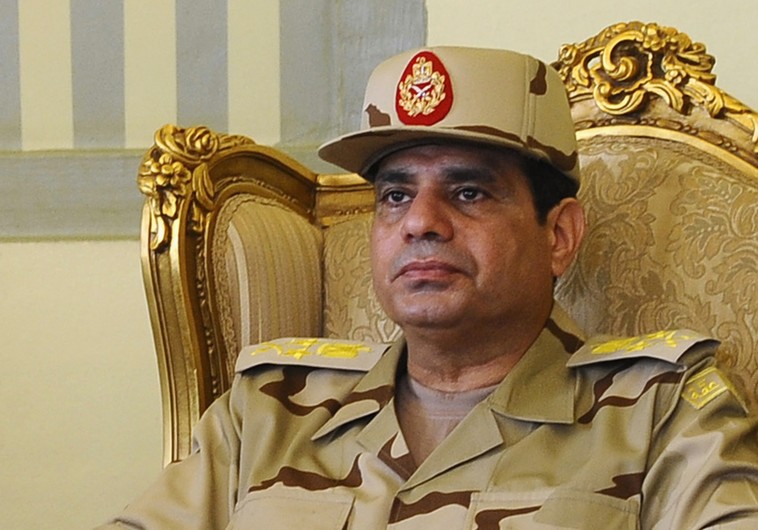Analysis: Egypt caught between the hammer and the anvil
Yoram Meital/Jerusalem Post/May 01/16
ON THE 37th anniversary of the Israeli- Egyptian peace deal, security cooperation between the two countries is at an all-time high. The two governments share an inimical view of Hamas rule in Gaza and both operate in various ways against Islamic State (ISIS) forces in Sinai. Nevertheless, opposition in Egypt to normalizing relations with Israel remains widespread. Five years ago the current level of security cooperation would have seemed highly unlikely.
The overthrow of Egyptian President Hosni Mubarak in February 2011 and the subsequent coming to power of the Muslim Brotherhood under Mohammed Morsi was seen in Israel as an extremely negative development.
So much so that it necessitated a significant change in Israel’s national security estimates and alignment.
True, Morsi’s Egypt continued to honor its commitments under the peace treaty. But Israeli decision makers were gravely concerned at the burgeoning cooperation between Cairo and Hamas, and the increase in hostilities along the border with Sinai. Morsi’s overthrow in July 2013 and the return to power of the generals under Abdel Fattah al-Sisi was enthusiastically welcomed.
The drastic change this brought about in Egypt’s attitude to Hamas (which the generals saw as a militant branch of the Muslim Brotherhood they had just ousted) and the uncompromising campaign it initiated against militant groups in Sinai were grist to the Israeli government’s mill. Israel quickly agreed to a significant increase in Egyptian forces in Sinai in areas which, according to the peace treaty, were supposed to be demilitarized.
Israeli diplomats were mobilized to help limit international criticism of Sisi’s authoritarian regime.
The honeymoon that characterizes the security and intelligence relations between Israel and Egypt is a direct result of the Sisi administration’s perception of real and imagined threats on the Sinai front and in the Gaza Strip. Nevertheless, the assumption that relations between the two countries are about to be upgraded in other spheres is no more than wishful thinking.
In Egyptian public discourse, Israel continues to be depicted as a hostile force and its policies are invariably presented in a negative light.
A case in point highlighting the depth of opposition to normalization with Israel was the recent expulsion from parliament of the outspoken member Tawfik Okasha.
Okasha had dared to invite the Israeli ambassador to his home and discuss politics over dinner. True, Okasha is something of a sensationalist who delights in provocation.
But the fact that his meeting with the ambassador prompted such a severe sanction reflects the intensity of public opposition to normalization.
The fighting in northern Sinai against ISIS affiliates is high on the Sisi government’s list of priorities. Hundreds of miles of desert separate Sinai from Egypt’s Nile valley heartland. But the working assumption of the decision makers in Cairo is that the ISIS presence in Sinai undermines their efforts to restore internal security and rehabilitate the economy.
The same is true of Egypt’s attitude to Hamas in Gaza. From day one, the Sisi administration saw Hamas as an adjunct of its arch-enemy, the Egyptian Muslim Brotherhood, which it had declared a terrorist organization and which it blamed for dozens of terror attacks.
In early March, Egyptian authorities accused Hamas of aiding and abetting members of the Brotherhood in the assassination last June of Chief Prosecutor Hisham Barakat. This grave charge was not retracted even after Hamas leaders condemned the killing and insisted that their movement does not interfere in Egypt’s internal affairs.
On the contrary, the Egyptian media are awash with leaks from security forces accusing Hamas of aiding Jihadist groups in Sinai in attacks that have taken the lives of hundreds of soldiers and border police.
The Sisi administration’s iron fist policy toward Hamas is evident on the ground.
The Rafah crossing point to Egypt, the only exit from Gaza that does not border on Israel, has been closed for most of the past two and half years. The Egyptian army has destroyed dozens of smuggling tunnels on Gaza’s western border with Sinai, evacuated thousands of Egyptian citizens from the border area, declared it a closed military zone and imposed severe travel restrictions throughout northern Sinai.
The far-reaching change in Egyptian policy came to the fore during Operation Protective Edge, the violent 49-day confrontation between Israel and Hamas in the summer of 2014. For the first time, Cairo blamed Hamas, and not solely Israel, for an armed clash between them.
Moreover, in contacts over ending the fighting, Egypt rejected key Hamas demands, including the lifting of the tight closure it and Israel had imposed on the Gaza Strip. Its position on reconstruction of Gazan infrastructure and buildings destroyed in the fighting and the supervision of renewed inflow of construction materials and goods was closer to Israel’s than to that of Hamas.
The Sisi government did not deviate from its hardline on Hamas even when international and Israeli organizations warned that Gaza with its 1.8 million inhabitants was on the verge of a serious humanitarian crisis.
In this context, various Israeli politicians proposed constructing a seaport in Gaza.
The Israeli military was apparently ready to go along with the idea despite the obvious security challenge it would pose. But the Sisi administration was quick to pour cold water on the proposal, effectively preventing a study of its feasibility.
Recently, however, the Sisi government’s attitude to Hamas has been modified somewhat in light of Egypt’s close ties with Saudi Arabia and its Gulf State allies. Serious interests are in the balance. These major oil exporters granted Sisi’s Egypt financial aid estimated at around $30 billion, saving it from certain bankruptcy. While Riyadh and Cairo see eye to eye on Iran as a serious threat and share the same criticism of the Obama administration’s hesitant Middle East policy, they are divided on the future of the Assad regime in Syria and on Hamas, which Saudi Arabia wants to include in the regional camp it leads.
Over the past few months there has been a significant reduction in Arab aid to Egypt.
This might go some way toward explaining the mid-March visit to Cairo by a high level Hamas delegation. However, from the talks it seems the inherent mistrust of Hamas has not abated and, besides a string of very general understandings, the delegation returned to Gaza empty-handed. For now, Egyptian policy makes it very tough for Hamas to function as a ruling establishment and hinders its preparations for renewal of the armed confrontation against Israel.
EGYPT’S POLICY toward Sinai and Gaza is not unrelated to the Sisi regime’s struggle for survival inside Egypt. The backing for a military man in the presidential palace stemmed from widespread hostility towards the Muslim Brotherhood and the expectation that the general-cum-president would quickly restore public order and revitalize the ailing economy. These hopes have not been met, and support for Sisi is waning. The main reason for this is that economic hardship has only got worse.
The flow of aid from the Gulf States and Saudi Arabia is drying up, foreign currency reserves are dwindling rapidly, the external debt has reached worrying proportions, unemployment is growing and the devaluation of the Egyptian pound is having a devastating effect on spiraling prices of goods and services.
Quiet in the streets has been achieved through a draconian law – which prohibits demonstrations and places curbs on free speech and human rights – and the imprisonment of thousands of opponents of the regime. Anger at the regime is mounting – even among people who initially supported Sisi.
The Sisi administration is caught between the hammer of bloody fighting in Sinai and the anvil of its struggle for survival in the face of growing socioeconomic hardship and mounting political criticism of Egypt’s would-be savior who failed to deliver.
Without underestimating the significance of the fighting in the far-flung areas of northern Sinai, the fate of the Sisi regime will be decided in the Nile valley heartland. The entry of the field marshal into the presidential palace was highly significant; but it is doubtful that it will prove to be the final stop in the long march of the Egyptian revolution that began with Mubarak’s overthrow five years ago and whose end is not yet in sight.
Prof. Yoram Meital is chairperson of the Chaim Herzog Center for Middle East Studies and Diplomacy at Ben-Gurion University in Beersheba





















